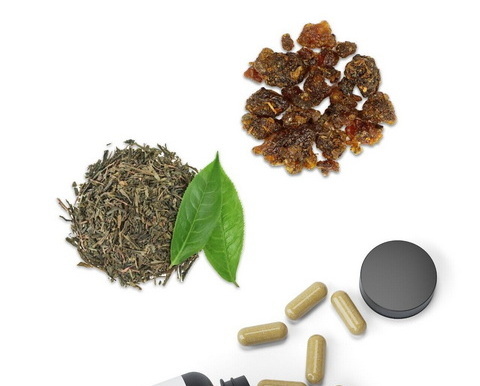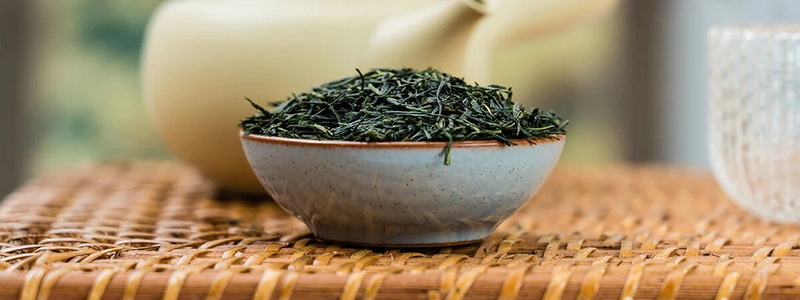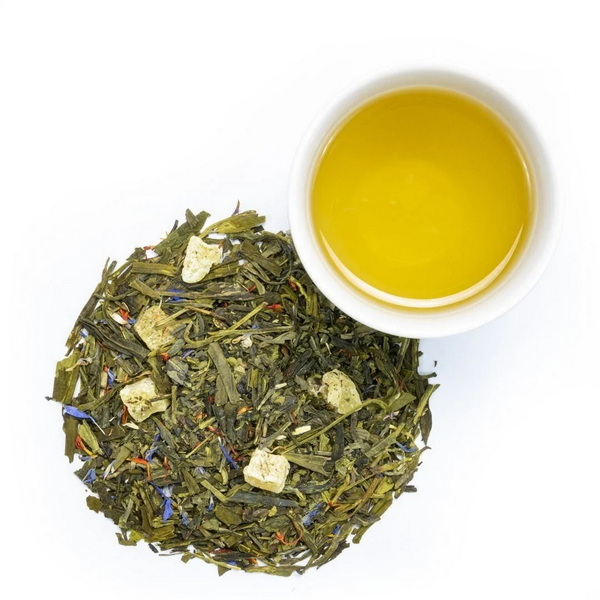Content Menu
● Understanding Garcinia Cambogia
>> What is Hydroxycitric Acid (HCA)?
>> Health Benefits of Garcinia Cambogia
>> Potential Side Effects of Garcinia Cambogia
● Exploring Green Tea Extract
>> Key Components of Green Tea Extract
>> Health Benefits of Green Tea Extract
>> Potential Side Effects of Green Tea Extract
● Garcinia Cambogia vs. Green Tea Extract: Key Differences
● Synergistic Effects?
● Conclusion
● FAQ
>> 1. Can I take Garcinia Cambogia and Green Tea Extract together?
>> 2. Are Garcinia Cambogia and Green Tea Extract effective for weight loss?
>> 3. What is the best time to take Garcinia Cambogia and Green Tea Extract?
>> 4. Can Garcinia Cambogia and Green Tea Extract cause liver damage?
>> 5. Are there any medications that Garcinia Cambogia and Green Tea Extract can interact with?
● Citations:
Garcinia Cambogia and Green Tea Extract are both popular supplements often touted for their health benefits, particularly in the realm of weight loss and overall wellness[2][3]. While they are both derived from natural sources and share some overlapping benefits, they are distinct substances with different compositions, mechanisms of action, and potential side effects. This article aims to clarify the differences between Garcinia Cambogia and Green Tea Extract, explore their individual benefits, and provide guidance on their safe and effective use.

Understanding Garcinia Cambogia
Garcinia Cambogia is a tropical fruit native to Southeast Asia and India. The fruit is small and pumpkin-shaped, and it has been used for centuries in traditional medicine for various purposes, including digestive health and appetite control. The active ingredient in Garcinia Cambogia that is responsible for its purported health benefits is hydroxycitric acid (HCA)[2].
What is Hydroxycitric Acid (HCA)?
HCA is a derivative of citric acid, which is found in many fruits. It is believed to work through several mechanisms:
1. Appetite Suppression: HCA may help suppress appetite by increasing serotonin levels in the brain. Serotonin is a neurotransmitter that affects mood and appetite. Higher serotonin levels may lead to reduced cravings and decreased food intake[2].
2. Fat Production Inhibition: HCA may inhibit an enzyme called citrate lyase, which is involved in the synthesis of fatty acids. By blocking this enzyme, HCA could potentially reduce the body's ability to produce and store fat[2].
3. Cholesterol Reduction: Some studies suggest that HCA may help lower LDL (bad) cholesterol and triglycerides[4].
Health Benefits of Garcinia Cambogia
1. Weight Loss: Garcinia Cambogia is most well-known for its potential to aid in weight loss. Several studies have investigated its effects on body weight, with mixed results[2]. Some studies have shown a modest reduction in weight, while others have found no significant effect.
2. Appetite Control: One of the primary claims associated with Garcinia Cambogia is its ability to suppress appetite[2]. This can be particularly beneficial for individuals who struggle with overeating or frequent cravings.
3. Improved Cholesterol Levels: Some research indicates that Garcinia Cambogia may help improve cholesterol levels by lowering LDL cholesterol and triglycerides[2][4]. Maintaining healthy cholesterol levels is crucial for cardiovascular health.
4. Blood Sugar Regulation: Garcinia Cambogia may also play a role in regulating blood sugar levels. Some studies have shown that it can improve insulin sensitivity and glucose metabolism, which is particularly relevant for individuals with diabetes or insulin resistance[2].
Potential Side Effects of Garcinia Cambogia
While Garcinia Cambogia is generally considered safe for most people, it can cause side effects in some individuals[2]:
-Digestive Issues: Nausea, stomach discomfort, and diarrhea.
-Headaches: Mild to moderate headaches.
-Skin Rash: Allergic reactions leading to skin rashes.
-Liver Problems: In rare cases, Garcinia Cambogia has been linked to liver damage.
-Interaction with Medications: Garcinia Cambogia may interact with certain medications, such as antidepressants and diabetes medications.

Exploring Green Tea Extract
Green Tea Extract is derived from the leaves of the *Camellia sinensis* plant. It is a concentrated form of green tea, containing a high concentration of antioxidants and beneficial compounds. Green tea has been consumed for centuries and is known for its numerous health benefits[2][3].
Key Components of Green Tea Extract
1. Polyphenols: These are antioxidants that protect the body against oxidative stress and damage from free radicals[2].
2. Catechins: A type of polyphenol, with epigallocatechin gallate (EGCG) being the most well-known and potent[2].
3. Caffeine: A stimulant that can enhance energy levels and mental alertness[5].
Health Benefits of Green Tea Extract
1. Weight Loss: Green Tea Extract is often included in weight loss supplements due to its potential to boost metabolism and increase fat burning[2]. Caffeine and EGCG can work together to enhance these effects.
2. Antioxidant Protection: The high concentration of antioxidants in Green Tea Extract helps protect the body against oxidative stress, which is linked to aging and various diseases[2].
3. Heart Health: Green Tea Extract can improve heart health by reducing blood pressure, lowering cholesterol levels, and improving blood vessel function[2][4].
4. Brain Health: The antioxidants in Green Tea Extract can protect brain cells from damage, potentially reducing the risk of neurodegenerative diseases like Alzheimer's and Parkinson's[2]. It has also been shown to improve memory by enhancing the connection between different parts of your brain[2].
5. Liver Health: Studies suggest that Green Tea Extract can improve liver function by reducing inflammation and oxidative stress[2].
6. Skin Health: Green Tea Extract can help prevent and treat various skin conditions, such as acne, rosacea, and premature aging[2][5].
7. Exercise Performance: Green Tea Extract increases antioxidant protection against oxidative damage caused by exercise, translating to better performance and recovery[2].
Potential Side Effects of Green Tea Extract
While Green Tea Extract is generally safe, it can cause side effects in some individuals[2]:
-Caffeine-Related Effects: Anxiety, insomnia, and heart palpitations.
-Liver Problems: High doses of Green Tea Extract have been linked to liver damage.
-Digestive Issues: Stomach upset, nausea, and diarrhea.
-Headaches: Mild to moderate headaches.
-Interaction with Medications: Green Tea Extract may interact with certain medications, such as blood thinners and stimulants.
Garcinia Cambogia vs. Green Tea Extract: Key Differences
Feature | Garcinia Cambogia | Green Tea Extract |
Active Ingredient | Hydroxycitric Acid (HCA) | Polyphenols (Catechins, EGCG), Caffeine |
Primary Benefits | Appetite suppression, fat production inhibition | Weight loss, antioxidant protection |
Weight Loss | May help with weight loss | Supports weight loss |
Antioxidant Effects | Limited antioxidant effects | High antioxidant activity |
Side Effects | Digestive issues, headaches | Caffeine-related effects, liver problems |
Synergistic Effects?
There is limited research on the combined effects of Garcinia Cambogia and Green Tea Extract. However, combining the two supplements may offer synergistic benefits for weight loss and overall health[2]. For example, Garcinia Cambogia may help suppress appetite, while Green Tea Extract can boost metabolism and increase fat burning.
Conclusion
Garcinia Cambogia and Green Tea Extract are distinct supplements with different active ingredients, mechanisms of action, and potential benefits. Garcinia Cambogia primarily works by suppressing appetite and inhibiting fat production, while Green Tea Extract offers a wide range of benefits, including weight loss, antioxidant protection, and improved heart and brain health.
While both supplements are generally considered safe, they can cause side effects in some individuals. It is essential to consult with a healthcare provider before taking either supplement, especially if you have any underlying health conditions or are taking medications.

FAQ
1. Can I take Garcinia Cambogia and Green Tea Extract together?
While it may be safe for some individuals, it is crucial to consult with a healthcare provider before combining these supplements. They can assess your health status and provide personalized recommendations.
2. Are Garcinia Cambogia and Green Tea Extract effective for weight loss?
Both supplements have shown potential for aiding in weight loss, but results vary. They should be used as part of a comprehensive weight loss plan that includes a healthy diet and regular exercise.
3. What is the best time to take Garcinia Cambogia and Green Tea Extract?
Garcinia Cambogia is often taken before meals to help suppress appetite. Green Tea Extract can be taken at any time of the day, but it is best to avoid taking it close to bedtime due to its caffeine content.
4. Can Garcinia Cambogia and Green Tea Extract cause liver damage?
In rare cases, both supplements have been linked to liver damage. It is essential to monitor your liver function regularly and discontinue use if you experience any symptoms of liver problems.
5. Are there any medications that Garcinia Cambogia and Green Tea Extract can interact with?
Yes, both supplements can interact with certain medications, such as antidepressants, blood thinners, and stimulants. Consult with your healthcare provider to ensure there are no potential interactions with your current medications.
Citations:
[1] https://pmc.ncbi.nlm.nih.gov/articles/PMC6412948/
[2] https://www.healthline.com/nutrition/10-benefits-of-green-tea-extract
[3] https://www.medicalnewstoday.com/articles/269538
[4] https://www.webmd.com/vitamins/ai/ingredientmono-960/green-tea
[5] https://health.clevelandclinic.org/green-tea-extract-a-better-way-to-boost-energy-or-not
[6] https://www.urmc.rochester.edu/encyclopedia/content?contenttypeid=19&contentid=greenteaextract
[7] https://www.nccih.nih.gov/health/green-tea
[8] https://www.health.com/nutrition/benefits-green-tea






























